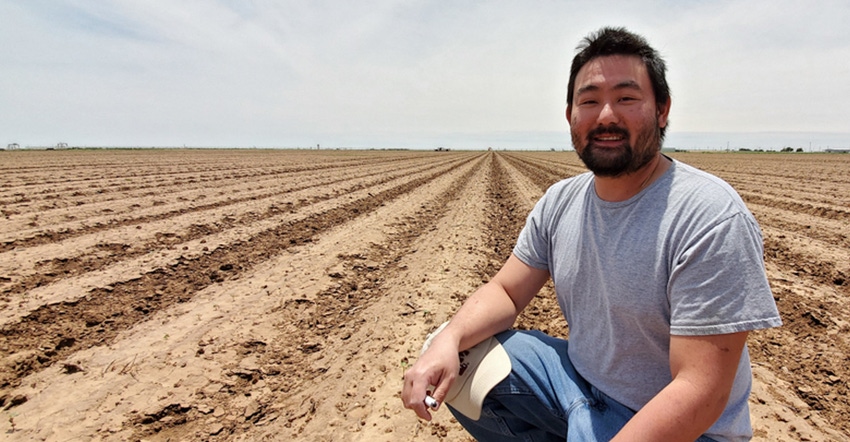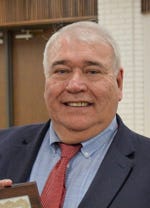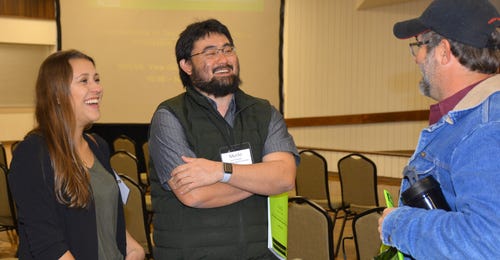
Cotton Specialist Murilo Maeda, Texas A&M AgriLife Extension, Lubbock, received the 2021 Dr. J. Tom Cothren Outstanding Young Cotton Physiologist Award at the virtual Beltwide Cotton Conferences on Jan. 7, 2021.
Texas A&M AgriLife Research and Extension Center Director Juan Landivar, Corpus Christi and Weslaco, presented the award, referring to Maeda as a family friend.
"Dr. Maeda satisfies the essence of this award with his work ethic, dedication, collaborative nature, and intellect, as well as his accomplishments," Landivar said.

Landivar has known Maeda since he was a teenager, including working together in Brazil at Deltapine. Later, as a graduate student, Maeda worked with Landivar through the Soil and Crop Sciences Department at Texas A&M University and eventually as a research scientist at the AgriLife Research and Extension Center, Corpus Christi.
"The work of Dr. Maeda in directing our cropping systems/precision management program at our center was outstanding," Landivar said. "In a short time, he assembled a remarkable research program and a large team of collaborators. This work resulted in the development of a strong, well-funded program and research linkage with coworkers from AgriLife, Texas A&M College of Agriculture and Life Sciences and other land grant universities. Murilo's research on the development and testing of remote sensor platforms has placed our research center in a leadership position in the state and the country."
Today, Maeda is the Extension cotton specialist in Lubbock.
"One of the outstanding contributions of Dr. Maeda in this new position is the introduction of unmanned aircraft systems (UAS) in cotton Extension and outreach activities," Landivar said. "These education programs include the real-time (online) display of cultivar trials and other cotton management demonstration plots. I commend his diligent work and leadership in the development of an advanced remote sensing research program."
Upon receiving the award, Maeda said, "For those of you who know me and know what I've been through, you know that receiving this award means a lot."
Farm Press caught up with Maeda following the award presentation.
A look back
Maeda's story begins at the 2009 Beltwide Cotton Conferences. He was on the brink of graduating with a bachelor's degree in biology from the Centro Universitário do Triângulo, Uberlândia, MG, Brazil. He was also working in Deltapine's cotton breeding program in Brazil.
" I was a research assistant at the time and knew I wanted to be in a better position in the future. I also knew that a Ph.D. would open some doors. Looking at my boss and thinking if that's where I wanted to be one day, I'd have to go back to school," Maeda said. In 2009, while visiting a cousin in Los Angeles, Maeda received an invitation that would change his course.
"I remember talking to Dr. Landivar on the phone. He told me he was going to be at the Beltwide. It was in San Antonio that year." Maeda rented a car and drove from California to Texas.
"Dr. Landivar lined up interviews with folks from Arkansas, Texas, and other places about coming for a master's degree.
"That's where the whole thing started."
Maeda was eventually accepted into the master's and later doctorate programs at Texas A&M University in College Station. But his pursuit of a U.S. education would come at a high cost.
"My wife Andrea and I moved here 10 years ago. I left my mom, dad, and my son, so I could pursue my graduate studies," Maeda began. "It's been a great personal sacrifice walking away from my entire family to move here."
 Murilo Maeda with his son, Zion, and wife, Andrea. (Photo courtesy of Murilo Maeda.)
Murilo Maeda with his son, Zion, and wife, Andrea. (Photo courtesy of Murilo Maeda.)
He faced many challenges. “Without an assistantship in the beginning of my studies and paying out-of-state tuition, I quickly spent all the cash I had saved. There was a time that without the help of my parents and in-laws, we would have had to go back.”
A language barrier further challenged Maeda's stateside education. Maeda had studied English throughout his life, but he spoke fluent Portuguese.
"The language was probably the hardest. It took me about a year to start feeling okay about talking to people. Those for whom English isn't your first language, you will relate. I arrived here, people are talking in English, and I was translating it into Portuguese. I'm formulating my answer in Portuguese and then trying to translate it to English as I speak.
"It took a while until I didn't have to do that anymore," he said. "Now it's almost second nature."
Maeda still speaks Portuguese with his wife at home but primarily speaks English. "Almost always now, I'm thinking in English rather than Portuguese. You’ll know you are doing good when your dreams come through in English with no captions. Yes, that’s a thing.”
While Maeda was adjusting to life in the U.S., his family's cotton farming operation in Brazil was diminishing. "We used to plant half our acreage in cotton with the other half in rotation with corn or soybeans," he said. "But the main focus was cotton."
Fractured family relationships eventually dissolved the family operation. "My family, going from a very successful farming business to where it is today, no one in my family that farms, is a tragedy. It does motivate me to continue looking after our farmers’ best interests so they can prosper."
Not on my own
Numerous obstacles stood between Maeda's pursuit of his education and a career that has earned him the J. Tom Cothren honor. "I didn't make it to where I am without help,” he said. He credited his colleagues, family and wife.
 Andrea and Murilo Maeda, left, visit with Jared Harris, USDA-ARS, at the Texas Plant Protection Association Conference. (Photo by Shelley E. Huguley)
Andrea and Murilo Maeda, left, visit with Jared Harris, USDA-ARS, at the Texas Plant Protection Association Conference. (Photo by Shelley E. Huguley)
He also addressed the graduate students in the virtual audience. "You've got to stay humble, work hard, and never forget those who helped you."
Dr. J. Tom Cothren
This award is also significant because Cothren, the award's namesake, was Maeda's co-advisor for his master's degree and advisor for his Ph.D.
"He was a one-of-a-kind person," Maeda said. "I've never met somebody that was so knowledgeable and yet so humble. We could walk in his office anytime and talk about cotton, physiology, and other things. If I had a question, a lot of times I knew he had the answer, but he would never say it. He would talk to you, quiz you and stimulate your critical thinking.
"He was just a sweet person, someone that had a tremendous positive impact on my personal and professional life. For that, I will be forever grateful," he said. Cothren passed away on October 16, 2014.
Wayne Smith, professor and associate department head, College of Agriculture and Life Sciences, noted in Maeda's support letter, what an outstanding student Maeda was and, "can confirm that Dr. Cothren leaned heavily on Murilo for the conduct of his cotton physiology program during Murilo's tenure with Cothren as a graduate student."
Glen Ritchie, department chair, Plant and Soil Sciences Department, Texas Tech University, echoed Smith's comments. "He represents the values that Dr. Cothren instilled in his students and in the physiology and plant nutrition community."
Maeda's Mission
Maeda has been the Extension cotton specialist in Lubbock since October of 2018. "Looking back at some of the names that came through this office before me, like Bob Metzer, James Supak, Kater Hake, Randy Boman and Seth Byrd, this job is not something I take lightly. I recognize the importance this position has on the High Plains, a region that is quite literally the center of the cotton universe.
See, Digital agriculture connects dots for crop improvement
“While we cannot fight Mother Nature, I believe I can contribute something to the advancement of agriculture, whether it's looking at new technologies or incorporating remote sensing into crop management. These new technologies are not a silver bullet, but I am confident they will eventually change the way we do agriculture research, Extension education and crop management. I am honored beyond words, to have the opportunity to serve the people of Texas in this capacity. Texas is, and will always be, a very special place for me.
The J. Tom Cothren Award is sponsored by PhytoGen.
About the Author(s)
You May Also Like






